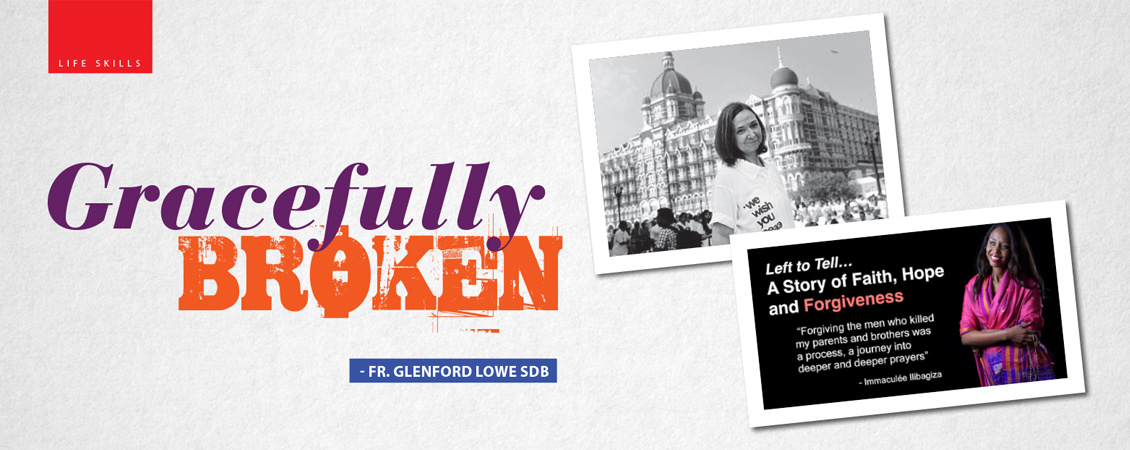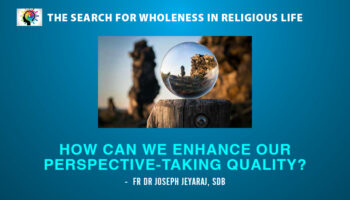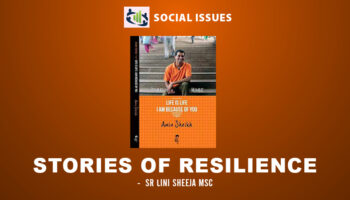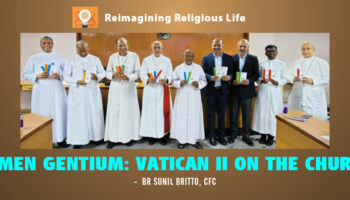After hiding in a toilet from would-be murderers for ninety-one days, and coming out weighing just 29 kilos, a twenty-one year old woman turned her bitter experience into a great lesson in living. So did a survivor of the terrorist attack in Mumbai. How did they do it? Can we do the same?
“I live happier now than when I had everything,” a serene Immaculee Ilibagiza affirms at a Leadership Excellence and Development (LEAD) 2017 Forum presentation.
Her story of brokenness goes back to April 1994, just before celebrating Easter. The shooting down of the plane over Kigali airport on 6 April 1994, left Rwandan President Juvenal Habyarimana, belonging to the Hutu tribe of Rwanda, dead! This triggered the beginning of a three-month long genocide in which the Hutus (the majority tribe) massacred the Tutsis, the other Rwandan tribe. The Rwandan holocaust, in a span of just one hundred days, left a million people dead and over two million refugees. A Tutsi survivor of the holocaust, Immaculee Ilibagiza was a barely twenty- one years old university student. Along with seven others, she hid in a small toilet measuring four feet by three feet, in the house of Pastor Simon Murinzi, a Hutu, for ninety-one days!
During this time, her entire family was brutally slaughtered. After nearly 275 days in darkness, hunger and thirst, stench, fear and extreme anxiety, Ilibagiza emerged a different person. She had weighed 52 kilos the day she went into hiding; her weight was down to just 29 kilos when she came out. Her bones stuck out of her frail body, but her heart was strong and forgiving. In her book, Left to Tell: Discovering God amidst the Rwandan Holocaust, she confesses that it was in that toilet that she discovered God. She learnt to cling on to hope, and she could forgive unconditionally, while she experienced the power of prayer and love. Her very name, Ilibagiza, means to ‘dispel the darkness’! A small bible that she borrowed from Pastor Murinzi and the last gift of a red and white rosary by her father to her, proved to be the defining supports for dispelling the darkness of those ninety-one days. Today, twenty-three years later, Ilibagiza is a staunch Catholic, a motivational speaker, author and member of the ‘Forgiveness, Reconciliation and Restorative Justice Forum.’ She takes time to care for a number of orphans. Her life is ‘gracefully broken.’ She uses the many ‘lessons learnt’ in that dark toilet to help other broken lives to find ‘grace’ and ‘love.’ She is no more the ‘Tutsi-cockroach’ waiting to be slaughtered but a beloved image of God to be imitated and loved.
Light in the darkness
Behind every dark cloud, there is a silver lining. The end of every tunnel is always ‘light-embracing.’ Ahead of every failure lies a step toward success. Beyond the pain of every loss, there is a new arrival. Life somehow, even miraculously, recreates the broken! Our history is chequered with lives of personalities who have faced the utmost hardships, shattered to a thousand pieces, broken beyond repair, torn apart like shredded cloth, disfigured beyond recognition and failed a thousand times over. And yet, these same lives radiate a deep connect with God that expresses itself outwardly through joy, serenity, peace, forgiveness and hope. Light radiates through the cracks in their lives.
Kia Scherr, whose husband Allen and daughter Naomi Scherr were shot dead at the Trident Hotel on 26/11/2008, when terror struck Mumbai, is a beacon of hope. Her peaceful life was torn apart by the brutal acts of Kasab and his gang. Surrounded by pain, loss, the need for revenge and hopelessness, Kia chose to be a ‘peace entrepreneur’ and started a whole movement called ‘One Life Alliance’ that promotes the sacredness of life. “Revenge isn’t a word in the lexicon of Kia,” quotes Jyoti P. Lavakare. In her ‘Letter to a Terrorist,’ now made into a short nine-minute documentary, Kia writes, “I feel, with each passing day, more alive than I have ever been!” Kia and Ilibagiza share the same line of thought. Both gracefully broken!
The Japanese have developed an unusual art form: ‘Kintsugi’ or ‘Kintsukuroi’ or the art of ‘golden repair.’ Broken ceramic jars are artistically joined together with a special lacquer dusted with gold, silver or platinum. The golden joinery, in fact, makes the broken ceramic container more beautiful and expensive. What would naturally have found its way to the waste bin, is now displayed on a showcase for all to admire.
Five Life Skills
Here are five simple life skills to convert your brokenness into something gracefully miraculous:
- ACCEPT THAT YOU ARE ‘PERFECTLY IMPERFECT’: There is great freedom in learning this life skill. Trying to live our lives ‘perfectly-perfect’ takes a toll on every cell in your system. Life was never meant to be a 100% success story, devoid of flaws, failures or tragedy. In fact, it is the ‘imperfectness’ of our lives that makes us more humane and brings out the compassionate and fragile-self of our lives. In embracing the imperfections in us, we find it easier to accept the brokenness of others. Life is a never-ending journey into becoming the best of who we were meant to be. But, this journey has to necessarily pass through periods of brokenness.
- COURAGE TO GATHER THE FRAGMENTS: We were not created to live shattered lives forever. In the journey of life, we do break and fall apart. It takes a lot of courage, and humility too, to get down on our fallen knees and gather the fragments. Every fragment is an important piece in the mosaic of your life. Your history cannot disown your painful past. It is only in hind-sight, we learn to appreciate the events of our past. Steve Jobs was right when he said, “We need to connect the dots. No one connects the dots with reference to the future. We always connect them with reference to our past.” In connecting the dots, the tapestry of our life becomes more vibrant and significant. No dot can be left out.
- SHARE THE STORY OF YOUR LIFE: The narratives of every life are important. They inspire and motivate people to take on a new direction in life. Hollywood and Bollywood are full of true life stories that inspire and give hope. Your life too can be inspiring. There is no shame in admitting your failures and brokenness. When your life is put to the test, it is your friends who come out the best.
- ACCEPT THE BROKENNESS OF OTHERS: Just as you are ‘perfectly-imperfect,’ accept that there are others like you in the same boat. It would be hypocritical to hide behind a ‘better-than-thou’ attitude. Perfection is not a competitive struggle we need to engage in. In our imperfections, we recognise our need for support, formation and compassion.
ALLOW GOD TO “KINTSUGI” YOU: Great saints were broken sinners who allowed God to Kintsugi their lives. Our brokenness is the very reason for divine intervention. The Psalmist rightfully says, “God comes to heal the broken-hearted and to bind up all their wounds” (Psalm 147:3) and “The Lord is near to the broken-hearted and saves those crushed in spirit” (Psalm 34:18). With God’s Grace, we are assured of a happier future than all the shame and hurt of our past. Let not your tomorrows be a continuation of your broken past. Jesus, the master carpenter, knows best the art of joinery. He can mend your brokenness gracefully. Allow Him to turn you into a masterpiece.

To subscribe to the magazine Contact Us





